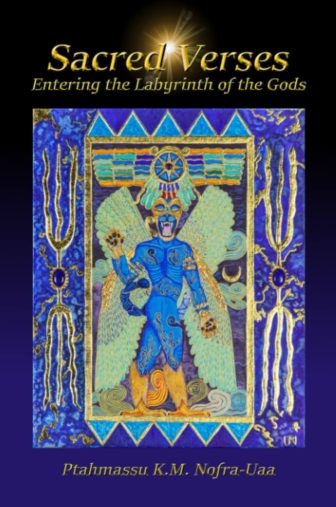
In times of darkness what sustains us is the memory of light. This month I wanted to take a moment to step away from the doomscrolling; the over-saturation of the stress from what seems to be an increasingly darkening world and focus a bit on something positive.
Here, let us lift up other queer voices who sing of the beauty of the world and who remind us of the spiritualty in the everyday moment. The divine in the Earth. In our bodies. Consider this a spiritual tonic meant to uplift and nourish, to strengthen and fortify our souls.
Ptahmassu Nofra-Uaa is an internationally noted iconographer, craftsman, spiritual teacher, and human rights advocate. He is perhaps best known for his stunning art, which is inspired by the ancient gods of Egypt. His pieces are more than simply “art”. They are devotional portals designed to transport the viewer into a space of divine connection and rapture.

Ptahmassu Nofra-Uaa from his website.
But his visual art is just one aspect of his divine offerings. Enter “Sacred Verses: Entering the Labyrinth of the Gods.” This book was originally written in 2016 but was just recently published in both hardcover and paperback, giving readers an opportunity to dive into the rich and sensual landscape of Nofra-Uaa’s masterful work.
Full disclosure: I received a hardcover copy of this book from the author as a gift and having been a fan of his artwork and being a poet myself, was eager for the opportunity to delve into the poetic revelry. I was not disappointed.
Each poem is an invocation to the ancient gods, but remarkably this book does not force the reader into any specific culture or tradition. While the gods are ever-present in this work, and the flavor of ancient Egyptian culture and philosophy is present like a noticeable spice, there are no mentions of specific deity names. This gives this work a broad appeal, opening the door for practitioners from many different magical paths to gain benefit.
The themes are universal: birth, life, death, humankind’s place on earth and the cosmos, the vast mystery of the cosmos and the gods. While at times more specific cultural symbols may emerge, they do not detract from the universalism of the work. The crocodile and the hippopotamus, for example, are not animals usually thought of in the larger neo-Pagan sense, but take their rightful places of power in a Kemetic philosophy, and so their presence here (along with the occasional reference to the “ba,” an ancient Egyptian term for part of the human soul) serve as gentle reminders of the origin of this particular work and the religious passions of the author.
Nofra-Uaa draws from the natural world and expresses a religious experience not confined by establishments, traditions, or dogma, but instead draws from the earth, the sun, the moon, the stars, and the body itself, to describe a religious state devoid of shame or spiritual fascism.
“Religious engagement is the horse we ride through the spheres of influence inhabited by our gods. This religious engagement, not being the institutions of organized religion or inflexible doctrine, but rather the framework provided by traditions that offer a means for touching the Holy Powers directly and drawing personal gnosis from Them.”
–Ptahmassu Nofra-Uaa, from the introduction
Nofra-Uaa reaffirms the prime authority of universal connection, and the process of moving through death and decay and into the rapturous light. To be immersed in the flows of these sacred verses is to sail across the seas of time and spirit, to face the abyss, and to return with the wisdom of the shadow. This is a recurring theme, expressed beautifully in the line, “We are all shadows, traveling through the open doors of the Earth.” There is an awareness of the transformative process of the spirit. This spirituality is a verb, taking action where others might be content to sit and simply be. There is an urgency here: to absorb every moment, to be present for every mundane second, for here it is revealed that the world in which we live –the bodies in which we live– is the foundation of everything; the secret door into another world that was ours all along, if only we had the eyes to see and the ears to listen.
This is a book that revels in the spiritualty of the physical, recognizing the divine rapturous presence within all things. The poetry is passionate and rich, offering the reader an opportunity to delve deeply into the sensuality of the world around them, opening a sacred gateway into the numinous. Like all poetry, in my opinion, they are best when read aloud, giving the spoken words the impetus to make their magic more fully known. Any magical group that wishes to focus on deepening their ability to collectively shift into altered states of devotional awareness would benefit greatly from performing shared reads of these sacred verses.
In times of darkness what sustains us is the memory of light. Books and art like these keep that memory alive.
Sacred Verses can be purchased here. Nofra-Uaa’s art can be viewed at this website.
[EDIT: An earlier version erroneously stated that ‘Sacred Verses’ was published in 2016. While written in 2016 it wasn’t published until late December 2021. We apologize for the error.]
The Wild Hunt always welcomes guest submissions. Please send pitches to eric@wildhunt.org.
The views and opinions expressed by our diverse panel of columnists and guest writers represent the many diverging perspectives held within the global Pagan, Heathen, and polytheist communities, but do not necessarily reflect the views of The Wild Hunt Inc. or its management.
The Wild Hunt is not responsible for links to external content.
To join a conversation on this post:
Visit our The Wild Hunt subreddit! Point your favorite browser to https://www.reddit.com/r/The_Wild_Hunt_News/, then click “JOIN”. Make sure to click the bell, too, to be notified of new articles posted to our subreddit.

